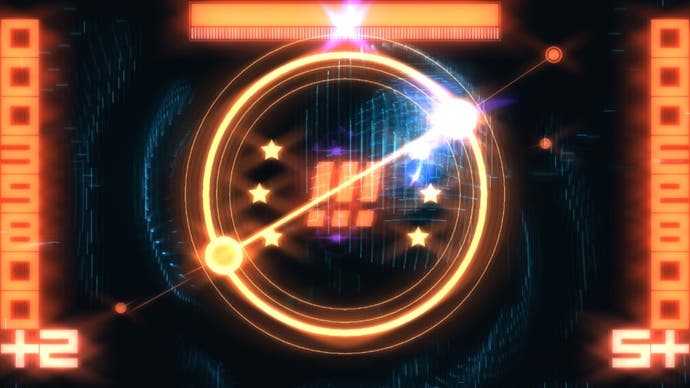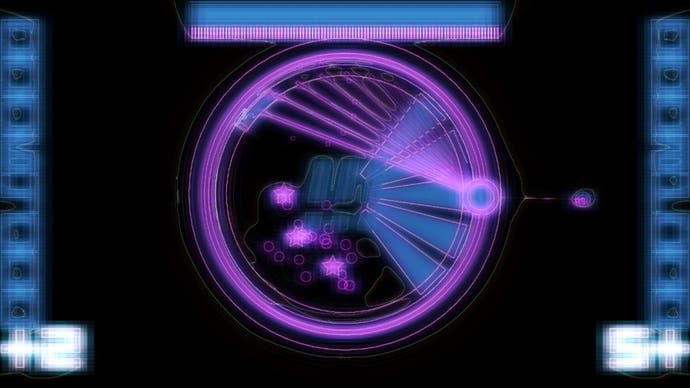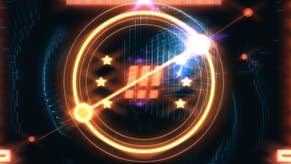Dropchord review
Fingerhouse.
An orange-rimmed circle hangs in a black, spherical space, its contours momentarily described by neon-blue hatch lines that pulse in the dark. Hold two thumbs to the screen and light streaks between them, joining up to create a throbbing beam that bisects the darkness. The monolithic lettering 'MENU' appears.
Dropchord is not like the other Double Fine games. Indeed, it appears that this curio from the San Franciscan game studio best known for Psychonauts, Sesame Street and Brütal Legend is a chance for the staff to take a break from all that difficult stuff like characterisation, humour and narrative puzzle design.
These are characteristics by which the studio - and its luminary founder, Tim Schafer - have become known. They are also some of the hardest things to get right in video games. With 2014's Broken Age looming, burdened as it is by the expectations of a successful, multi-million-dollar Kickstarter campaign, small wonder DoubleFine has retreated for a moment into an abstract mobile game - also available on Ouya and for the Leap Motion controller for PC and Mac (see sidebar, below) - which features no characters, no one-liners and a thumping soundtrack to drown out all that peripheral noise.

This game's boundaries are tight and defined. It takes place entirely within the womb-like sphere, your thumbs sweeping and dancing around its circumference. The rules are simple: position the beam that stretches between your two digits in order to strike through the notes that appear within the circle. Soon enough, peril is introduced by way of 'scratches', red dots that you must avoid touching with your beam.
Strike all of the notes in a section without a scratch to score a perfect pattern. A trio of congratulatory exclamation points triggers on-screen, increasing your multiplier. All the while, you play to the heartbeat pound of a house soundtrack as your successful swipes trigger firework explosions that light up the screen with falling stars and fizzing particles.
Billed as music game, the music and the game in Dropchord are, in truth, divorced. At best, they inform one another, the taps and sweeps of your thumbs performing a sort of figure skater's dance across the iPad's finger-smeared glass to the rhythmic musical backing. But timing is of no real consequence here. So long as you hit your 'notes' before the timer runs down, the order of your performance has no bearing on either the sounds you hear or the score you receive.
Which begs the question: is Dropchord a music game at all? In truth, it's more accurately described as a series of dexterity challenges performed against the clock in the belly of an Ibiza dance club. But who cares? Much like Tetsuya Mizuguchi's Rez, Meteos and Child of Eden, Dropchord is a game with a trance aesthetic whose interactions and challenges are separate to the musical backing, but greatly enhanced by it. Played with a decent set of headphones, you'll soon settles into a smeary reverie as you circle the bowl of that ultimate score attack mind-state: flow.

This isn't to say that Dropchord relies on style over substance. There is craft here. Every note has been placed with precision and care, ensuring that the game's micro-challenges build in complexity and delightfulness as you play. Soon enough, scratches begin to move around the sphere on fixed paths, obscuring the notes you must hit, and you'll need to carefully track them with your thumbs in order to perfect a sequence.
Later, you must remove you thumbs entirely, tapping smaller circles that appear inside the play sphere. Even further into the game, you must flick one thumb in order to spin the beam, lighting up segments within the circle. The only way to refill your health bar after hitting scratches is by scoring perfect runs, and in this way an overarching rhythm of success and failure is established. In another out-of-character move from Double Fine, Dropchord is built on score attack foundations, with competitive leaderboards and a Full Mix mode complete with three-letter high score table name entry.
Dropchord is a straightforward game built around an elegant idea. The range of applications of the idea is too limited for this to be considered more than a stylish curio - and, in opting for a purely abstract backdrop, it has none of the opaque sense of narrative progression felt in Rez of Child of Eden. But Dropchord demonstrates Double Fine's expanding range and competency as the studio begins to diversify. This may be a palette-cleansing effort for the studio's staff, but in Dropchord's case that sense of creative liberation works in our favour.










